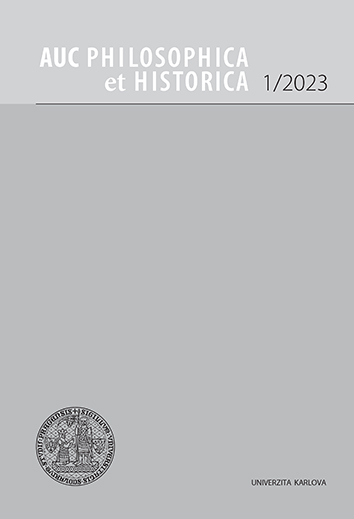AUC Philosophica et Historica (Acta Universitatis Carolinae Philosophica et Historica) is a multidisciplinary academic journal focused on the humanities with more than 50 years of tradition.
The journal is indexed in CEEOL, DOAJ, and EBSCO.
AUC PHILOSOPHICA ET HISTORICA, Vol 2020 No 1 (2020), 67–76
Kam dnes zaměřit sociologickou imaginaci? Úvaha o problémech soudobé sociologie 60 let po vydání Millsovy stěžejní práce
[Where to focus the sociological imagination today? A reflection on the problems of contemporary sociology 60 years after the publication of Mills' pivotal work]
Jiří Šubrt
DOI: https://doi.org/10.14712/24647055.2020.24
published online: 15. 12. 2020
abstract
Essay
references (42)
1. <bez popisu>
2. Alexander, J. C. (1988). Neofunctionalism and After. Malden: Blackwell.
3. Archer, M. S. (1995). Realist Social Theory: The Morphogenetic Approach. Cambridge: Cambridge University Press. CrossRef
4. Becker, G. S. (1982). Der ökonomische Ansatz der Erklärung menschlichen Verhalstens. Tübingen: Mohr.
5. Berger, P. L., & Luckmann, T. (1989). The Social Construction of Reality: A Treatise in the Sociology of Knowledge. New York: Doubleday / Anchor Books.
6. Bhaskar, R. (1978). On the Possibility of Social Scientific Knowledge and the Limits of Naturalism. Journal for the Theory of Social Behavior, 8(1), 1-28. CrossRef
7. Blumer, H. (1969). Symbolic Interactionism: Perspective and Method. Englewood Cliffs: Prentice-Hall.
8. Boltanski, L., & Thévenot, L. (2007). Über die Rechtfertigung: Eine Soziologie der Kritischen Urteilskraft. Hamburg: Hamburger Edition.
9. Boudon, R. (1977). Effets pervers et ordre social. Paris: PUF.
10. Boudon, R. (1980). Die Logik des gesellschaftlichen Handelns: Eine Einführung in die soziologische Denk- und Arbeitsweise. Neuwied: Luchterhand.
11. Bourdieu, P. (1998). Practical Reason: On the Theory of Action. Cambridge: Polity Press.
12. Burt, R. S. (1992). Structural Holes: The Social Structure of Competition. Cambridge: Harvard University Press.
13. Coleman, J. S. (1986). Social Theory, Social Research, and a Theory of Action. American Journal of Sociology, 91(6), 1309-1335. CrossRef
14. Coleman, J. S. (1994). Foundations of Social Theory. Cambridge: The Belknap Press of Harvard University Press.
15. Eisenstadt, S. N. (1963). The Political Systems of Empires: The Rise and Fall of the Historical Byrocratic Societies. New York: Free Press.
16. Elias, N. (1991). The Society of Individuals. Oxford: Basil Blackwell.
17. Esser, H. (1993). Soziologie: Allgemeine Grundlagen. Frankfurt / New York: Campus Verlag.
18. Foucault, M. (2007). The order of things: An archeology of the human sciences. New York: Routledge.
19. Garfinkel, H. (2002). Studies in Ethnomethodology. Cambridge: Polity Press.
20. Gellner, E. (1988). Plough, Sword and Book: The Structure of Human History. London: Collins Harvill.
21. Giddens, A. (1997). The Constitution of Society: Outline of the Theory of Structuration. Berkeley / Los Angeles: University of California Press.
22. Goffman, E. (1959). The Presentation of Self in Everyday Life. New York: Doubleday.
23. Granovetter M. (1974). Getting A Job: A Study of Contacts and Careers. Chicago: University of Chicago Press.
24. Habermas, J. (1981a). Theorie des kommunikativen Handelns, Band 1: Handlungsrationalität und gesellschaftliche Rationalisierung. Frankfurt am Main: Suhrkamp.
25. Habermas, J. (1981b). Theorie des kommunikativen Handelns, Band 2: Zur Kritik der funktionalistischen Vernunft. Frankfurt am Main: Suhrkamp.
26. Homans, G. C. (1961). Social Behavior: Its Elementary Forms. New York: Harcourt, Brace & World, Inc.
27. Latour, B. (2005). Reassembling the Social: An Introduction to Actor-Network-Theory. New York: Oxford University Press.
28. Luhmann, N. (1984). Soziale Systeme: Grundriß einer allgemeinen Theorie. Frankfurt am Main: Suhrkamp.
29. Lévi-Strauss, C. (1986). Structural Anthropology. Harmondsworth: Penguin Books.
30. Malinowski, B. (1990). The Group and the Individual in Functional Analysis. In P. Colomy (ed.), Functional Sociology (s. 3-29). Aldershot: Edward Elgar.
31. Mann, M. (2012). The Source of Social Power: A History of Power from the Beginning to A.D. 1760. Cambridge / New York: Cambridge University Press.
32. Mead, G. H. (1967). Mind, Self, and Society: From the Standpoint of a Social Behaviorist. Edited by C. W. Morris. Chicago: University of Chicago Press. CrossRef
33. Mills, C. W. (1967). The Sociological Imagination. New York: Oxford University Press.
34. Münch, R. (1987). Theory of Action: Towards a New Synthesis Going Beyond Parsons. London: Routledge & Kegan Paul.
35. Parsons, T. (1966). The Structure of Social Action: A Study in Social Theory with Special Reference to a Group of Recent European Writers. New York: The Free Press.
36. Parsons, T. (1966). The Social System. New York: The Free Press.
37. Radcliffe-Brown, A. R. (1990): On the Concept of Function in Social Science. In P. Colomy (ed.), Functional Sociology (p. 30-38). Aldershot: Edward Elgar.
38. Schütz, A. (1960). Der sinnhafte Aufbau der sozialen Welt: Eine Einleitung in die Verstehende Soziologie. Wien: Springer Verlag. CrossRef
39. Šubrt, J. (2015). Individualismus a holismus v sociologii: Jak překonat teoretické dilema? Praha: Sociologické nakladatelství (SLON).
40. Šubrt, J. (2019). Individualism, Holism and the Central Dilemma of Sociological Theory. Bingley: Emerald. CrossRef
41. Tilly, Ch. (1990). Coercion, Capital and European States, AD 900-1990. Malden / Oxford: Blackwell.
42. Wallerstein, I. (1974). The Modern World-System I: Capitalist Agriculture and the Origins of the European World-Economy in the Sixteenth Century. New York: Academic Press.

Kam dnes zaměřit sociologickou imaginaci? Úvaha o problémech soudobé sociologie 60 let po vydání Millsovy stěžejní práce is licensed under a Creative Commons Attribution 4.0 International License.
